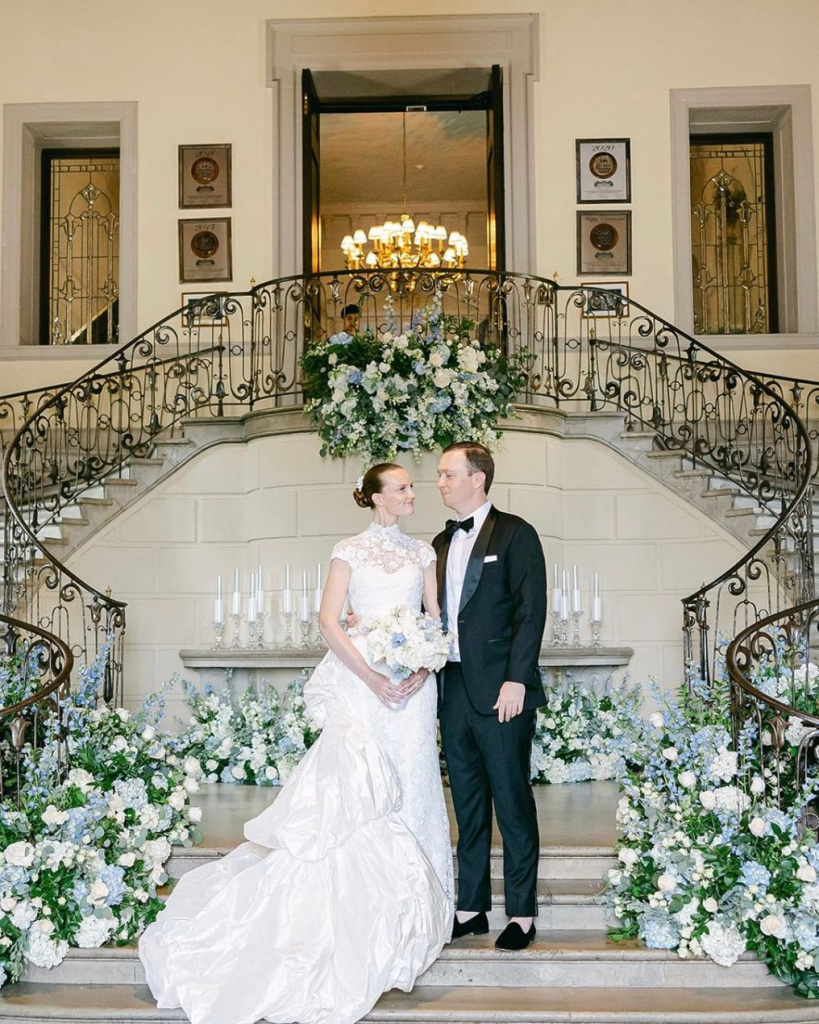Who Pays for the Wedding: A Modern Guide to Wedding Expense Etiquette
- Author: Natali Grace Levine
- Reading time: 5 min 48 sec
- Publication date: 02/04/2024
- Updated: 01/21/2025
Who pays for what in a wedding is a complex matter steeped in tradition, evolving social norms, and practical financial considerations. With weddings today costing over $30,000 on average, couples have to make important decisions on how to budget and allocate expenses. While old wedding etiquette dictated the bride's family pays for the event, that tradition has shifted as couples marry later, pay their own way, and blend family cultures. Beyond tradition, couples now choose creative split options to share costs equitably based on individual means and priorities.

Navigating who pays for the wedding starts with an open conversation about expectations, abilities, and family dynamics. Couples may decide to split everything evenly, pay by category, accept family contributions, or mix approaches. Communication is key so there are no awkward assumptions or unwanted surprises. With some forethought and honesty, couples can strike the right balance between upholding traditions, expressing family bonds, and forging their own path.

Wedding Payment Traditions vs. Modern Expectations

In the past, tradition held that the bride's family paid for the wedding, hosting the event, and covering all associated costs. This reflected societal norms of the bride's family "giving her away" to the groom's family. Specific expenses traditionally fell under the bride's family domain, including the ceremony and reception venue, catering, wedding cake, decorations, music, flowers, and the bride's wedding dress. Meanwhile, the groom's family was responsible for the rehearsal dinner, rings, honeymoon, and officiant fees.
Wedding Etiquette: Who Pays For What
Today, those antiquated traditions have largely faded as couples pay for weddings themselves or split costs more equitably. With couples getting married later in life after establishing careers and finances, there is less expectation for parents to solely foot the bill. Blended families from divorce and remarriage also shift dynamics. That said, some parents still contribute as a gift or gesture of bonding. The prevailing wisdom is for couples to decide expenditure divisions in a way that appropriately honors family bonds and traditions while setting their own course.
Who Pays for Wedding Dress
The question of who buys a wedding dress is deeply personal and symbolic. In days gone by, the bride's parents purchased her gown as part of their customary role in hosting the wedding. But norms have shifted in modern times. Nowadays, most independent brides pay for their own dress when they can afford it. Still, some parents choose to contribute to the cost as a cherished gift and bonding moment. Couples must decide based on their financial realities and family relations. There is room for gracious tradition or forging new ground. Each family must have thoughtful talks to navigate the sensitive topic of the wedding dress with care and wisdom. In the end, traditions can be honored while also celebrating the couple’s path ahead in their own style.
How Couples Today Split Wedding Expenses

With the traditions around who pays for what in a wedding becoming obsolete, contemporary couples have to thoughtfully determine their own preferred approach to covering costs. They must take into account their financial situations, family dynamics, cultural backgrounds, and wedding priorities and values.
Most couples today create their own blueprint for equitably dividing expenses in a mutually agreeable way. There are several common modern frameworks couples utilize:
- Splitting everything 50/50 - This even division of all wedding costs is straightforward and egalitarian. It works well when both partners are on the same page financially. However, disparities in income may make a rigid 50/50 split unfair. Discussing budgets in advance is crucial.
- Dividing by category - With this approach, the couple assigns entire categories of wedding expenses to each partner. One may cover the venue, catering, and cake while the other tackles attire, music, and photography. This can play to their individual strengths and interests. But coordination is key.
- Accepting family contributions - Many couples partially self-fund the wedding but accept monetary gifts from parents for specific elements, like the flowers, dress, officiant fee, or rehearsal dinner. This blends traditional family support with the couple paying the lion's share. Clear communication about gift amounts and boundaries is essential.
- Hybrid split - Often couples use a combination of approaches, based on their financial means, family relations, and cultural backgrounds. One family may gift a set budget, the couple self-funds the rest evenly, but the partner with more savings covers any overages. Custom solutions work when couples discuss openly and regularly.
Today's couples are advised to start a dialog early about fairly splitting costs in line with their values. Being open about budgets, family dynamics, and wedding priorities allows couples to craft creative compromises. While some traditions can be maintained, couples should feel empowered to personalize their wedding expense divisions in a way that suits them. The wedding is just the start of a lifetime partnership, and money matters warrant thoughtful teamwork.

Navigating Financial Contributions from Parents

Even when couples pay for most wedding expenses, parental contributions are still relatively common and can be a point of confusion. If families offer to pitch in, couples should have candid conversations to align on expectations and avoid misunderstandings.
Make Gift Amounts Explicit
Parents need to be very clear and upfront about precisely how much money they intend to contribute towards the wedding. Vague promises of support can lead to problems down the road. Couples should gently ask parents to name the exact dollar amount they will be gifting. This eliminates ambiguity in the planning process. Having concrete gift figures in writing is ideal, so there is no backpedaling later.
Parents may offer to contribute a lump sum or cover specific items like the rehearsal dinner or flowers. Regardless, the couple should get dollar totals for each category confirmed in advance. This reduces the odds of frustrated parents suddenly claiming "We never agreed to pay that much!" after the fact when bills come due. To avoid tension, the couple must secure firm monetary commitments rather than relying on assumptions.
Discuss Conditions or Input
Along with nailing down dollar amounts, couples should also tactfully inquire if any strings are attached to the parents' monetary gifts. For example, parents may expect to have increased opinions or control over guest lists, venue, menu, etc. If parents envision their contribution as buying decision-making power, it's far better for couples to know this early before making big plans. Couples can then thoughtfully negotiate reasonable compromises upfront, rather than fighting resentful battles later.
Issues may arise if parents think bankrolling aspects of the wedding entitles them to shape that piece of the event. But couples may differ, seeing parent funding as a generous gift that doesn't warrant ceding all control. These disconnects should be discussed openly and non-confrontationally. The couple must clarify how much input parents want in return for contributions. If major strings are attached, declining the money may be the wiser path forward.

Confirm Timelines
Beyond gift totals and expectations, nailing down contribution timelines is crucial. Couples should secure clear commitments from parents on precisely when funds will be transferred at each wedding planning stage. Ambiguous assurances of "don't worry, we'll take care of it" can derail budgets down the line. Locking in dates for installment payments as deposits come due prevents financial chaos.
For example, the couple may need a check from parents next month to secure the venue and again in 6 months to pay the caterer deposit. Getting specific about transfer dates in writing guarantees the money will really arrive on schedule. Couples should manage expectations by explaining upfront when funds need to be in their bank account so parents don't delay and create problems.
Politely Decline Unwanted Gifts
Of course, having to refuse monetary gifts from parents can be challenging. Couples should explain their reasoning kindly but firmly. Suggesting reasonable compromises is wise too. The goal is to prevent building resentment. If parents won't budge on unacceptable conditions, the couple must stand their ground while making it clear they still appreciate the intent and want to collaborate.

Send Gift Letters
For substantial cash gifts, it is wise for couples to request a gift letter from parents outlining details. This documents that the money was truly a gift, not a loan. Having evidence protects both parties later on if tax confusion arises. Gift letters should confirm the giver, recipient, and amount and that repayment is not expected.
Without documentation, large sums can raise red flags with the IRS and cause problems. And verbal gift agreements mean nothing legally if disputes occur. The safest route for large contributions is having parents sign a simple gift letter specifying the transaction. This eliminates any doubts and shows money exchanged hands without strings attached. If parents ever do seek repayment in the future, the letter would clarify the money was not a personal loan.















